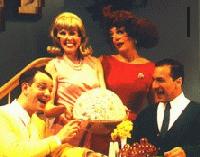SEARCH CurtainUp
On TKTS
LETTERS TO EDITOR
REVIEWS
FEATURES
ADDRESS BOOKS
Broadway
Off-Broadway
DC
NEWS (Etcetera)
BOOKS and CDs
OTHER PLACES
Berkshires
DC (Washington)
London
Los Angeles
QUOTES
FILM
LINKS
MISCELLANEOUS
Free Updates
Masthead
Type too small?
NYC Weather
Down South
by Les Gutman
|
Cocktails at 7, dinner at 8, masturbation at 9.
---Doug Field's Jennifer |

A. De Santis, A. Vaughn, E. McLaughlin
and D. Fortunato (Photo: Carol Rosegg) |
Until now, that is. Doug Field's Down South takes us behind the sanitized curtain, and what we learn might shock you.
The time is late October, 1962, which is important because the Cuban Missile Crisis is in progress. This is one of those watersheds in American political consciousness -- when ordinary citizens became mobilized by the threat of nuclear holocaust. If you buy Mr. Field's rather sketchy premise, it's also a turning point in our sexual consciousness -- a time when women first began to think of sex as something more than a means of procreation and of pleasing their husbands. The play's title conflates both focuses. (I'll leave it to the reader to parse the double entendre.)
The gleeful existence of the Barneses, Jennifer (Alice Vaughn) and Bob (Anthony De Santis) -- marvelously evoked not only by John McDermott's ultra-60's set design, Paule Doss's "period" costumes and Patricia Peek's outrageous but picture-perfect hair designs but by Rick Spark's balletic staging of the delicious opening scene -- soon lands with a thud when Jennifer confronts Bob, cheerfully but insistently, with her sexual needs, which he is not about to satisfy. Complaining about her demands to his buddy, Eddie Undulato (Dean Fortunato), Bob thinks he's found a solution. Eddie circumnavigated the "problem": his wife, Cheryl (Erin McLaughlin), satisfies herself, and she can teach Jennifer to do the same. A dinner party (at which Cheryl's attraction to Bob is less than subtle) is held at the Barnes's home, after which the womenfolk repair to the bedroom. The offstage ooh-ing and ah-ing that ensues suggests Cheryl is a good teacher. Also in the mix is a nosy, intrusive neighbor, Sue Stevens (Audrey Rapoport), who will attend a subsequent get-together with her flamboyantly gay husband, Stephen (David Bicha), the predictably farcical set-up for the finale.
Rick Spark's punchy direction amply supports a number of fine, exuberant performances. The tone is quite intentionally over-the-top, cartoonish and parodical. Both Vaughn and De Santis conjure up priceless characters, hers filled with bouncing treacle that belies what's on her mind, his equally cloying in a painfully straight and sanctimonious way. Equally on target is Rapoport, whose Sue is pricelessly grating, judgmental and shrill. Incidentally, while Bob generally refers to himself as "Bob" or "Mr. Barnes," when Sue calls her mother -- she does it often; there has to be some outlet for the product of all of her snooping -- she always announces it's "Sue Stevens" calling.
Where Down South falters is in its script. Field has a number of funny ideas, but he works them over until they get stale. Jennifer is duly terrorized by the impending threat from Cuba, and having her acculturate herself Hispanically is clever, but Field milks the idea too many times. Introducing the swishy Stephen late in the play has a hackneyed feel from the outset, but wouldn't be so bad if Field hadn't overloaded the character with what comes to feel like his 100 best jokes about gay husbands. Once this repetition gets laced with a shaky "women's lib" angle that doesn't fit the period, the play's earlier strength dissipates, leaving the cast to work far too hard to sell his manic conclusion as an updated drawing room farce in which, for a moment at least, no one ends up with the spouse they arrived with. It ends up feeling like a solid 45 minute piece that's been stretched by half an hour against its will.
|
Down South
by Doug Field Directed by Rick Sparks with David Bicha, Anthony DeSantis, Dean Fortunato, Erin McLaughlin, Audrey Rapoport, and Alice Vaughn Set Design: John McDermott Lighting Design: Ed McCarthy Costume Design: Paule Doss Sound Design: Rick Sparks Running Time: 1 hour, 15 minutes including no intermission Rattlestick Theatre, 224 Waverly Place (off 7 Av @ 11th St) Telephone (212) 239-6200 Opening July 10, 2001, closing extended to September 9, 2001 Mon, Wed - Sat @8, Sun @3 and 7; $40 Reviewed by Les Gutman based on 7/18/01 performance |



